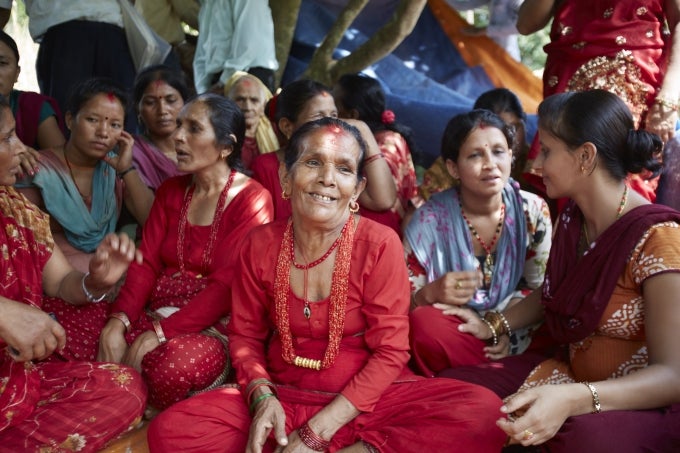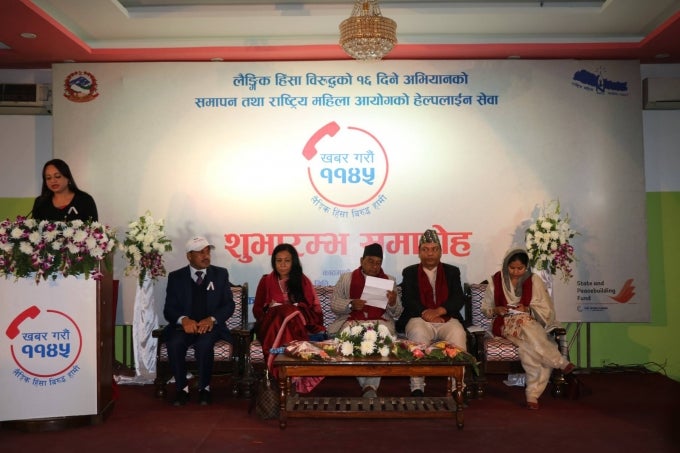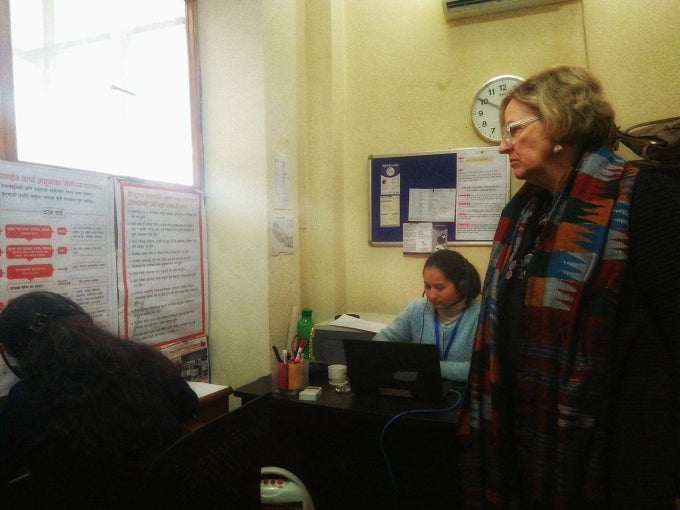
24/7 helpline to support victims.
On my visit to Kathmandu in January, I visited the Khabar Garaun 1145 (Inform Us) helpline set up to support survivors of Gender Based Violence (GBV).
In a small room, two operators respond tirelessly to callers as part of a 24 hour, seven days a week service. They assess callers’ needs, and refer them to receive legal aid, psycho-social support, child support and shelter. Each entry, whether it comes in by phone, email or text message, is carefully recorded through an online system, that eases the task of tracking and referring cases. The referrals connect them to response service providers including the Nepal Police, One-Stop Crisis Management Centers run by the Ministry of Health, and Non-Governmental Organizations.
Since its launch by the National Women Commission (NWC) in December 2017, the helpline has received 1,938 calls from women seeking assistance to deal with GBV, with 180 cases being registered. Cases are registered only after a preliminary assessment is conducted, and immediate necessary support provided. It is heartening that so many survivors are coming forward to report cases. But the numbers are clearly alarming.

There are various social restrictions that prevent women from speaking out and reporting incidents of gross injustice. With the introduction of the Khabar Garaun 1145 helpline, we hope that GBV survivors can find shelter, legal, psycho-social and remedial measures quickly and effectively. In fact, this is pioneering work by a government agency that can be a model for other countries, an innovation to note as we mark International Women’s Day. But it also illustrates the disturbing extent of GBV in Nepal, which is a leading cause of death for adult women. We need to eliminate GBV because it has devastating consequences on individuals, families and communities, along with large economic and social costs.
Recently, an incident of a gang rape of a 21-year old woman was reported to the helpline. As follow up, the NWC counselor personally visited the survivor and traumatized family members and provided psychosocial and legal counseling, before referring the case. The survivor's husband was grateful for the support NWC provided – from counseling to collecting evidence and strengthening the case that resulted in a verdict to arrest perpetrators. “When our entire world seemed to collapse, this support helped restore a little of our faith in humanity,” he said. This is the kind of concrete support that is needed for women across the world.

It is also interesting to note that this helpline is an outcome of a Violence Against Women hackathon, that sought innovative technological solutions to address domestic violence. The hackathon was a side event of a campaign that
aimed to break the silence on GBV through bringing together thought leaders. That idea has resulted in this project piloted in 33 rural and urban municipalities, the first of its kind in the region. While a strong institution is already owning the project, political will and good policies will further help refine and expand the program.
Another key need is to have women in decision-making positions, to enable better and more protective laws for GBV survivors, as well as stringent regulations against perpetrators. In Nepal, there has been progress in the meaningful participation of women in all structures of the state. Women won 40 percent of seats in the recent local body election, 91 percent of which were in the position of deputy mayors. This is a small step forward, as one of the Bank’s major goals in the days ahead will be to encourage women to join and make their presence felt more strongly in the labor force, across the South Asia region and beyond.

Finally, we must never forget that GBV, at home or in public, is deeply rooted in gender-based discrimination, inequitable gender norms, and imbalanced power dynamics. To end all forms of GBV, we must address its social and structural causes. We need to engage men as allies for gender equality so they can act as human helplines for those in immediate need of support. An under-appreciated fact is that men can play a significant role in preventing GBV. They can be a check on the behavior of other men. Young men can tell their peers that rape and other forms of GBV are simply not acceptable and shameful. It is when we are all committed to stopping GBV that we will hopefully one day see its end.



Join the Conversation